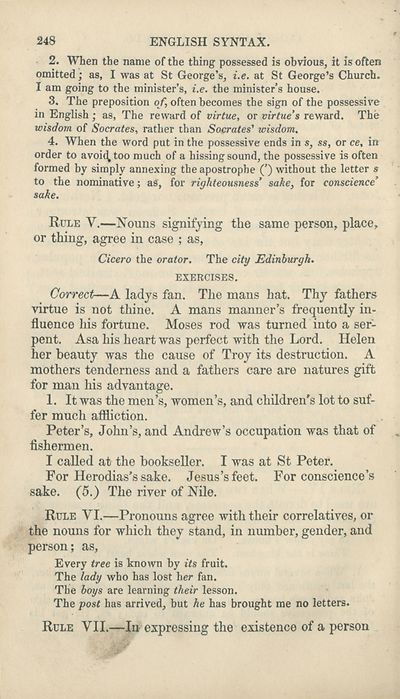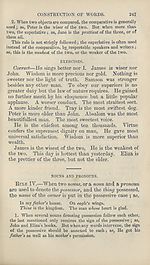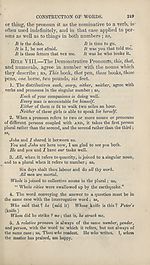Books and other items printed in Gaelic from 1841 to 1870 > Double grammar, of English and Gaelic, in which the principles of both languages are clearly explained
(250) Page 248
Download files
Complete book:
Individual page:
Thumbnail gallery: Grid view | List view

248 ENGLISH SYNTAX.
2. When the name of the thing possessed is obvious, it is often
omitted; as, I was at St George’s, i.e. at St George’s Church.
I am going to the minister’s, i.e. the minister’s house.
3. The preposition of, often becomes the sign of the possessive
in English; as, The reward of virtue, or virtue’s reward. The
wisdom of Socrates, rather than Socrates’ wisdom.
4. When the word put in the possessive ends in s, ss, or ce, in
order to avoic^too much of a hissing sound, the possessive is often
formed by simply annexing the apostrophe (’) without the letter s
to the nominative; as, for righteousness’ sake, for conscience’
sake.
Rule V.—Nouns signifying the same person, place,
or thing, agree in case ; as,
Cicero the orator. The city Edinburgh.
EXERCISES.
Correct—A ladys fan. The mans hat. Thy fathers
virtue is not thine. A mans manner’s frequently in¬
fluence his fortune. Moses rod was turned into a ser¬
pent. Asa his heart was perfect with the Lord. Helen
her beauty was the cause of Troy its destruction. A
mothers tenderness and a fathers care are natures gift
for man his advantage.
1. It was the men’s, women’s, and children's lot to suf¬
fer much affliction.
Peter’s, John’s, and Andrew’s occupation was that of
fishermen.
I called at the bookseller. I was at St Peter.
For Herodias’s sake. Jesus’s feet. For conscience’s
sake. (5.) The river of Nile.
Rule VI.—Pronouns agree with their correlatives, or
the nouns for which they stand, in number, gender, and
person; as,
Every tree is known by its fruit.
The lady who has lost her fan.
The boys are learning their lesson.
The post has arrived, but he has brought me no letters.
Rule VII.—In expressing the existence of a person
2. When the name of the thing possessed is obvious, it is often
omitted; as, I was at St George’s, i.e. at St George’s Church.
I am going to the minister’s, i.e. the minister’s house.
3. The preposition of, often becomes the sign of the possessive
in English; as, The reward of virtue, or virtue’s reward. The
wisdom of Socrates, rather than Socrates’ wisdom.
4. When the word put in the possessive ends in s, ss, or ce, in
order to avoic^too much of a hissing sound, the possessive is often
formed by simply annexing the apostrophe (’) without the letter s
to the nominative; as, for righteousness’ sake, for conscience’
sake.
Rule V.—Nouns signifying the same person, place,
or thing, agree in case ; as,
Cicero the orator. The city Edinburgh.
EXERCISES.
Correct—A ladys fan. The mans hat. Thy fathers
virtue is not thine. A mans manner’s frequently in¬
fluence his fortune. Moses rod was turned into a ser¬
pent. Asa his heart was perfect with the Lord. Helen
her beauty was the cause of Troy its destruction. A
mothers tenderness and a fathers care are natures gift
for man his advantage.
1. It was the men’s, women’s, and children's lot to suf¬
fer much affliction.
Peter’s, John’s, and Andrew’s occupation was that of
fishermen.
I called at the bookseller. I was at St Peter.
For Herodias’s sake. Jesus’s feet. For conscience’s
sake. (5.) The river of Nile.
Rule VI.—Pronouns agree with their correlatives, or
the nouns for which they stand, in number, gender, and
person; as,
Every tree is known by its fruit.
The lady who has lost her fan.
The boys are learning their lesson.
The post has arrived, but he has brought me no letters.
Rule VII.—In expressing the existence of a person
Set display mode to:
![]() Universal Viewer |
Universal Viewer | ![]() Mirador |
Large image | Transcription
Mirador |
Large image | Transcription
Images and transcriptions on this page, including medium image downloads, may be used under the Creative Commons Attribution 4.0 International Licence unless otherwise stated. ![]()
| Permanent URL | https://digital.nls.uk/106542765 |
|---|
| Description | Out-of-copyright books printed in Gaelic between 1631 and 1900. Also some pamphlets and chapbooks. Includes poetry and songs, religious books such as catechisms and hymns, and different editions of the Bible and the Psalms. Also includes the second book ever published in Gaelic in 1631. |
|---|

